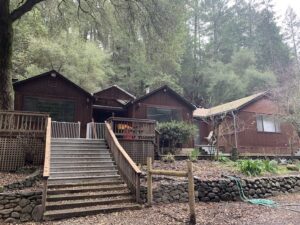Henry Hollow
2020 was a hard year for all of us. We had been at our farm, Henry Hollow, for five years, and felt like we were finally starting to understand the land and what it needed from us. As a long time “aspiring” homesteader, I was finally reaching my goal of producing most of our food myself. We were also nearing our goal of net-zero waste, though we were well off from our net-zero energy goal. Our water conservation efforts had paid off with increased streamflow for the native salmon, and we were starting to get a handle on forest management. But not soon enough.

The 2020 Glass Fire took our farm and everything on it. We escaped with our children, our go bags, and a handful of animals. We lost our home, outbuildings, and most of the animals that we had to leave behind. Even our brand new rainwater catchment tank, full of water, ironically burned. When we were able to return a few days later, there was nothing but smoking rubble and liquid metal. The ground smoked. Giant doug firs and redwoods, hundreds of years old, had burned, and their massive underground root structures were smoldering and shifting under our feet.
I felt the same about our future, like trying to build a house on quicksand. What followed was a period of mourning and uncertainty. Where would we live? How would we live? Was my homesteading dream ash, along with all of our possessions? But slowly I realized possessions are nothing, they come and go. I never lost the most important things: my family, and the knowledge I learned in those years.
Out of the Ashes
When we were able to buy another acreage, my background allowed us to accelerate the set-up phase. I could see much more quickly this time what the land needed, and what it could support. I made calculations and moved ahead swiftly and decisively. At the same time, I started work on my A.S. in Sustainable Agriculture at SRJC, and took classes in soil science, botany, crop planning, animal production systems, tractor mechanics, pest management and composting, among others. The A.S. degree, along with the potential of my land, allowed me to scale up and begin producing food for the community, in addition to my family. At Fern Homestead, we support the food needs of 3+ families and we plan to keep expanding our food production capacity within the regenerative agriculture model. We also offer workshops in homesteading skills, as well as an annual paid internship for an aspiring farmer.
In addition to my farming background and education, I’ve toured other farms tirelessly. I’ve dragged my family to so many of what I see as a fascinating stroll through the farmer’s mind, and what they see as a dusty walk through yet another field. I’m lucky they’re willing to humor me, because I’ve learned so much from other farmers. I’ve heard directly from them what they’ve tried, what worked, what didn’t work, and what they’d do differently next year.
Now I’m able to share my knowledge and experience with others who may need support and guidance to begin their small farming journey.
